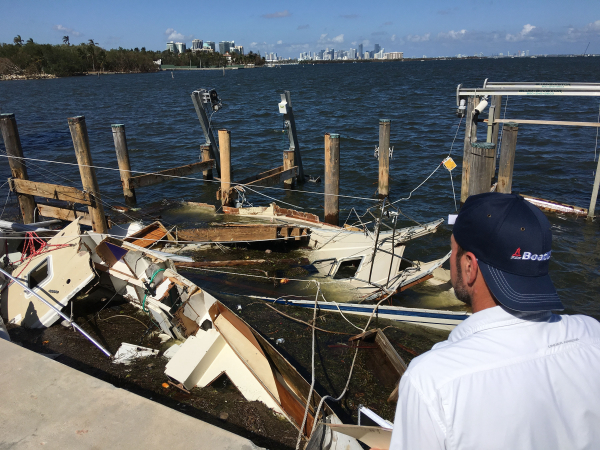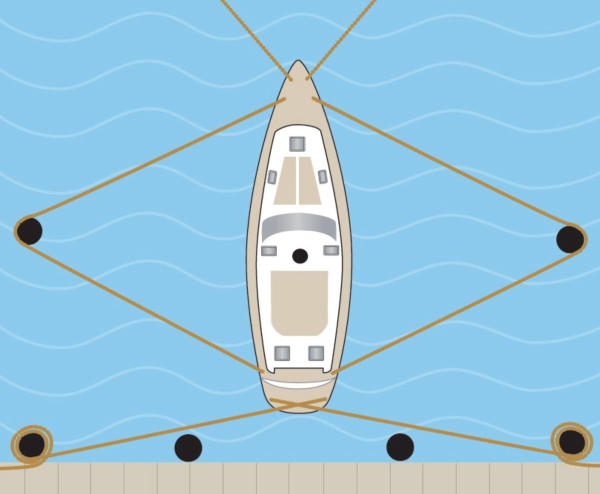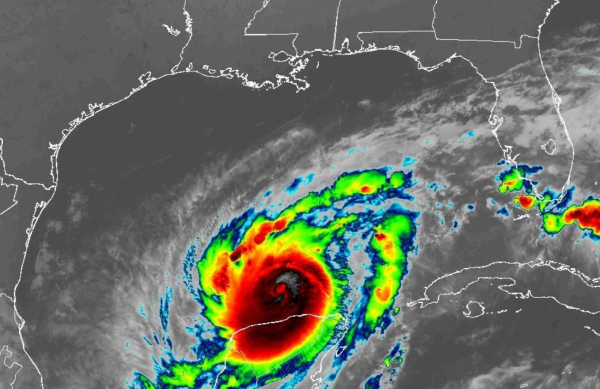
Many boats are likely to sink at the docks or on their moorings as Milton strikes the Tampa Bay area unless owners make extensive preparation. (BoatUS)
I spent over 40 years of my life on Tampa Bay, and fall hurricanes were a part of our lives just like the arrival of the king mackerel heading south. We’d get a little water over the sea wall, a few trees down, maybe a stranded catfish on the street—all good.
But “Milton” is a different kind of storm, and it appears to be headed almost directly at the bay or perhaps just south of it.
It’s bad enough that this is likely to be a Cat 3 or higher when it hits land—it’s arriving as many people throughout this area are still digging out from the massive flooding and wind damage left by Helene just a couple weeks ago.
This one has the potential to be one of the worst ever because the communities are already tired, because of the power of the storm, and because the state and federal resources for disaster recovery are already stressed to the max.
Plus, the evacuation area is so heavily populated that the departing residents are overtaxing the highway facilities—many are reporting scarcity of gas and motels anywhere near the Interstates.

At a strong, protected dock, proper tieups can help a boat survive. (BoatUS)
There seems to be no way that this does not turn out to be a major blow to the state’s already reeling home insurance industry as well as to its attraction as a place to live. Some residents have already been flooded four times in four years, and this will make five—the appeal of a life near the beach begins to pale when you hear stories like that.
In any case, thousands of Florida boaters are likely to be impacted heavily by the storm, whether or not they live on the water.
The Florida Fish and Wildlife Conservation Commission (FWC) has released the following recommendations, for those who have not already secured their vessels.
- If your boat can be trailered, haul it out of the water and move it to a safe location as far from tidal waters as possible. This includes kayaks and other recreational watercraft.
- If your vessel must stay in a marina berth, double all lines and rig cross-spring lines fore and aft, and attach lines high on pilings to allow for tidal rise or surge.
- If your vessel is at anchor, move to the most protected area possible and set out multiple anchors with at least a 10:1 scope, remove canvas coverings if possible, and remove or secure any sails.
- If your vessel is to remain on a mooring, make sure it is designed to withstand the load that your vessel will place on it. Inspect chains and swivels connecting to the mooring buoy and double up on the pendant.
- Remember to remove Electronic Position Indicating Radio Beacons (EPIRBs), life rings, life jackets and loose items from the boat and store them in a safe, indoor location.
- Use the Florida Boat Ramp Finder to find a ramp near you.

Milton is a massive, powerful storm sure to wreak destruction, and it's headed for one of Florida's most populated waterfronts. (NOAA)
Cover all lines to prevent chafing
- Wrap all lines where lines feed through chocks with tape, rags and rubber hoses or leather. Install fenders, fender boards or tires to protect the boat from rubbing against the pier, pilings or other boats.
Charge batteries and make sure they can run automatic bilge pumps throughout the storm
- Consider adding backup batteries and shut off all other devices that consume electricity.
Do NOT stay onboard and do NOT venture out into rough conditions
- If you’re onboard during a bad storm, you are risking your life and the lives of potential responders.
- Learn what Florida law says about mandatory marina evacuations. Chapter 327.59, F.S., Marina Evacuations.
After the storm, report issues to the FWC
- Check marina eligibility for disaster relief through Small Business Administration loans. SBA Disaster Assistance.
- Report missing and/or damaged waterway markers.
- Report storm-damaged boats that might be lost or abandoned to your local law enforcement agency (preferred) or the FWC Division of Law Enforcement at 888-404-3922.
- Call 911 or use VHF Marine Radio Channel 16 to report distress and other emergencies. Social media should not be used to report life-threatening distress due to limited resources to monitor the dozens of social media platforms during severe storm events.
For more storm preparation resources, visit MyFWC.com/boating and click on “Boater Education,” then click on “Storm Prep Resources.”
— Frank Sargeant
Frankmako1@gmail.com


